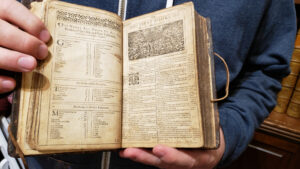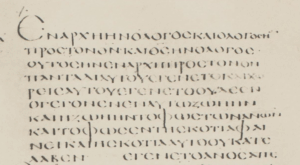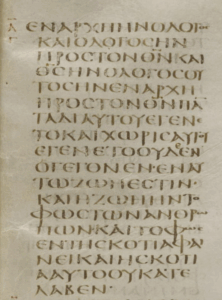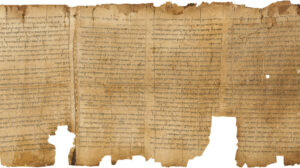 I am glad we do not believe in sola scriptura. We’d be in trouble.
I am glad we do not believe in sola scriptura. We’d be in trouble.
The phrase sola scriptura means “by scripture alone.” Some faiths believe that the Bible is the sole inerrant authority for Christian faith and practice. They believe that the Bible is the only infallible rule of faith, meaning it is without error and is the most reliable guide for Christians. They maintain that the Bible contains all knowledge necessary for salvation, either explicitly, or through logical deductions.
That introduces a number of fairly concerning questions.
When we say “the Bible,” what exactly does that mean? Is it any printed Bible? Of the many, wildly varying translations, which one are we saying is flawless? Or are we saying that the words as written by the original scribes is infallible? If so, that introduces further problems. There are no surviving original manuscripts. The closest we have are written in Greek and Hebrew from hundreds of years later. So are those the versions that we consider perfect? Does that mean that only people who learn those languages have access to the infallible word of the Lord? If that’s true, why bother with any translation at all?
That approach just doesn’t really work.
What about new revelation? Isn’t the Giver of revelation greater than what is revealed? How does scripture come about if not through the Lord’s chosen servants? Where would a Prophet and Apostles rank in authority as compared to scripture given through them?
Let’s explore some of these questions and see if we can’t find some answers.
The Best Version
Let’s start with this one: Which version of the Bible is the most correct?
To determine that, existing copies must be compared. If you’re like me, you maybe initially thought that the oldest manuscripts would be the most accurate. Earlier means closer to the original, doesn’t it? Maybe.
Suppose we have a 6th century scribe who was careless and sloppy, making a copy that had come from a long line of 200 other copies. On the other hand, we have a 19th century scribe who is fully trained, very careful, and meticulously copied a very accurate manuscript from the 3rd century? The 19th century copy may be more accurate in that case. Age does not always guarantee accuracy.
In addition, there are several passages in our Bibles that are not found in earlier manuscripts. Some of the most famous include the Comma Johanneum1 and the Pericope Adulterae2. There is a whole List of New Testament verses not included in modern English translations3.
Who added those passages and why? Does that make the Bible untrustworthy? (of course it doesn’t).
The King James Version
The content of scripture is actually a bit harder to determine than I think many good brothers and sisters realize.
Since the King James Version of the Bible was first published in 1611, there have been more than 20,000 changes made to it. The KJV we use today is actually based on the 1769 version produced by Benjamin Blayney.4,5
The King James Versions was translated using very recent manuscripts. The Masoretes were extremely dedicated to making very high-quality, exact copies. The Masoretic (Hebrew) texts were excellent copies, but from as recently as the 10th century.6 A very large portion of what is in the King James Version of the Bible came from William Tyndale, a personal hero of mine. I cannot say enough good about this man. His translation came from the Textus Receptus, which had been first compiled and published in 1516 by Desiderius Erasumus. Stephanus and Beza revised it later, In turn, the source material for that was from the 12th to 14th centuries. So these were very late manuscripts.7
They did as good as anyone could have with the few texts they had access to. They may have had access to a few dozen or Greek texts, and used essentially one Masoretic text. Since then, we have discovered tens of thousands of additional, older sources.
Do not think that I am diminishing in any way the importance of the King James Bible. It was a crowning masterpiece of English literature in its time. I believe it was inspired. I’ve even had a thrilling opportunity to hold King James’ very own copy of the King James Bible.
Recent Sources
They just didn’t have the quality or number of ancient texts that we have discovered since then. Let’s take a look at a few that we currently have that they did not.
Codex Alexandrinus
One of the oldest copies of the Bible is the Codex Alexandrinus. In 1627, Patriarch Cyril Lucar sent this codex from Constantinople to King Charles I. It is a nearly complete copy of the Septuagint, one of the earliest versions of the whole Bible in Greek. It was originally written in the early 5th century. Below, you can see the first five verses of Chapter 1 of the Book of John from the autotype facsimile of this Codex, available online.8 More info on Wikipedia.9
Codex Sinaiticus
Another great manuscript is the Codex Sinaiticus, also one of the oldest and most complete copies of the Bible in Greek. It was written in the 4th century and found in 1859 by Constantin von Tischendorf, centuries after the KJV was produced. Below are the same five verses of John 1, but from the Codex Sinaiticus, available online.10 More info on Wikipedia.11
Dead Sea Scrolls
Another amazing collection is the Dead Sea Scrolls, which were discovered in 1947. These manuscripts may have been written as long ago as 270 B.C. They were found in eleven caves in Qumran, on the northwest shore of the Dead Sea. They contain a considerable amount of the Old Testament, but not all of it. Below is part of the Great Isaiah Scroll from the Dead Sea Scroll collection. This project is also available online.12 More info on Wikipedia.13
These are just a few wonderful examples of thousands.
Well, what about the Book of Mormon? Have any changes been made to the Book of Mormon? Yes. At least 4,000 changes have been made to the Book of Mormon since the first edition (see the Church Newsroom).14
The Answer
It is absolutely a fascinating rabbit hole to go down to learn all about the many ancient scrolls, codices, manuscripts, and other texts. There are scores of dedicated believers who did everything in their power to honor their sacred stewardships in preserving the Holy Scriptures.
What do we do with all of the versions and revisions? Which one is the right one?
None of that uncertainty keeps me up at night, and it shouldn’t bother you a bit. Why?
As important as the scriptures are, they are not the final source of all truth. Revelation through the Prophet and Apostles, the chosen servants of the Lord, is ultimately more authoritative than the scriptures are. That is the mechanism through which they were given to us, and therefore greater.
If every copy of the scriptures on the planet was destroyed, the Lord could restore them in their perfect form at will through the Prophet. Think of how we got the Joseph Smith Translation of the Bible.
In their current form, they are imperfect. The fact that we have them as they are indicates that the Lord approves of what is in them.
Brother Robert L. Millet explains why such changes should not affect our testimonies:
“We do not believe the Bible must be transmitted perfectly to be spiritually normative and eternally valuable. Errors in the Bible should not tarnish its image for Latter-day Saints. For that matter, while we accept the Book of Mormon, Doctrine and Covenants, and Pearl of Great Price as holy scripture, we would not rush to proclaim their inerrancy. The greater marvel is that an infinite and perfect God can work through finite and imperfect humans to deliver his word to his children.”15
Brother Millet summarizes the thought eloquently. Even though there is ample evidence that the scriptures have been altered, or have errors in them, we still know that they are true. We hold them in the highest regard as sacred volumes of holy writ containing God’s will for mankind.
Elder Alexander B. Morrison also has some thoughts on the matter. He explains:
“To Latter-day Saints, the Bible is much more than a ‘human document.’ We revere and respect it. We honor it. We recognize that it is not complete nor entirely accurate, but hopefully we never forget that latter-day revelation sustains, supports, and verifies the biblical account of God’s dealings with His children.
“To me, at least, the authorship of James, and for that matter the other books of the New Testament as well, is of far less importance than the messages and testimonies of the Holy Messiah which they bear. I honor them as holy scripture, the word of God given for our edification and instruction, ‘as far as [they are] translated correctly’ (Article of Faith 8). The testimony of the Holy Ghost, which teaches us ‘all things’ (John 14:26) and testifies that Jesus is the Only Begotten Son of the Father (John 15:26), is independent of who the author of a particular book was.
“These examples of changes in the New Testament scriptures over the years—and many more could be mentioned—underline what to me is an important issue: scripture itself is not sufficient authority for one’s Christian faith. To that must be added at least two things: the whisperings of the Spirit—that Spirit which teaches the truth and testifies of it—and the traditions and teachings of modern-day prophets and Apostles.”16
Even in its imperfection, the Bible still contains the word of God to us. The Holy Ghost bears testimony to us of its truth.
The Importance of Prophets and Apostles
The importance of living prophets and Apostles is illustrated in the following exchange between Joseph Smith and Brigham Young, as related by Wilford Woodruff:
“I will refer to a certain meeting I attended in the town of Kirtland in my early days. At that meeting some remarks were made that have been made here today, with regard to the living oracles and with regard to the written word of God. The same principle was presented, although not as extensively as it has been here, when a leading man in the Church got up and talked upon the subject, and said: ‘You have got the word of God before you here in the Bible, Book of Mormon, and Doctrine and Covenants; you have the written word of God, and you who give revelations should give revelations according to those books, as what is written in those books is the word of God. We should confine ourselves to them.’ When he concluded, Brother Joseph turned to Brother Brigham Young and said, ‘Brother Brigham I want you to take the stand and tell us your views with regard to the written oracles and the written word of God.’ Brother Brigham took the stand, and he took the Bible, and laid it down; he took the Book of Mormon, and laid it down; and he took the Book of Doctrine and Covenants, and laid it down before him, and he said: ‘There is the written word of God to us, concerning the work of God from the beginning of the world, almost, to our day.’ ‘And now,’ said he, ‘when compared with the living oracles those books are nothing to me; those books do not convey the word of God direct to us now, as do the words of a Prophet or a man bearing the Holy Priesthood in our day and generation. I would rather have the living oracles than all the writing in the books.’ That was the course he pursued. When he was through, Brother Joseph said to the congregation: ‘Brother Brigham has told you the word of the Lord, and he has told you the truth.'”17
We believe that the Giver of the revelation is greater than the written record of the revelation.
Revelation from the Lord to his chosen mouthpiece will always give us what we need right now. In his BYU speech entitled “Fourteen Fundamentals in Following the Prophet,” Elder Ezra Taft Benson explains:
“The living prophet is more important to us than a dead prophet.
“…God’s revelations to Adam did not instruct Noah how to build the ark. Noah needed his own revelation. Therefore, the most important prophet, so far as you and I are concerned, is the one living in our day and age to whom the Lord is currently revealing His will for us. Therefore, the most important reading we can do is any of the words of the prophet…
“Beware of those who would pit the dead prophets against the living prophets, for the living prophets always take precedence.”18
Once we receive the words of the Prophet and Apostles, the same spirit of revelation that revealed it to them will give us a testimony of their truth.
Conclusion
Yes, scriptures are of such great worth and value to us. Many have given their lives to preserve them for future generations, including ours. They are very precious and valuable. Let’s keep things in perspective, though. We do not rely upon scripture alone to guide us. The Prophet receives revelation, and gives it to us. We hear it, pray about it, and receive our own witness that it is true revelation.
Study the scriptures, and also follow the Prophet. You’ll do just fine.
Related Videos
- A Lamp in the Dark: The Untold History of the Bible | Full Movie
- How We Got the Bible: Ancient Manuscripts to the King James Version
- “How We Got the Bible” by Sean Finnegan
Sources
- Wikipedia Contributors. “Johannine Comma.” Wikipedia, Wikimedia Foundation, 18 Sept. 2025.
- Wikipedia Contributors. “Jesus and the Woman Taken in Adultery.” Wikipedia, Wikimedia Foundation, 3 Dec. 2019, en.wikipedia.org/wiki/Jesus_and_the_woman_taken_in_adultery.
- “List of New Testament Verses Not Included in Modern English Translations.” Wikipedia, 23 Oct. 2022, en.wikipedia.org/wiki/List_of_New_Testament_verses_not_included_in_modern_English_translations.
- Norton, David. A Textual History of the King James Bible. Cambridge University Press, 2005.
- “Changes in the King James Version.” Bible-Researcher.com, 2025, www.bible-researcher.com/canon10.html.
- “Masoretic Text.” Wikipedia, 4 Apr. 2021, en.wikipedia.org/wiki/Masoretic_Text.
- Wikipedia Contributors. “King James Version.” Wikipedia, Wikimedia Foundation, 28 Nov. 2018, en.wikipedia.org/wiki/King_James_Version.
- “Manuscript GA 02 – CSNTM.” Csntm.org, 2025, manuscripts.csntm.org/manuscript/Group/GA_02?sequence=999. Accessed 11 Oct. 2025.
- Wikipedia Contributors. “Codex Alexandrinus.” Wikipedia, Wikimedia Foundation, 10 Oct. 2025.
- “Codex Sinaiticus – Home.” Www.codexsinaiticus.org, www.codexsinaiticus.org/en/.
- “Codex Sinaiticus.” Wikipedia, 12 May 2022, en.wikipedia.org/wiki/Codex_Sinaiticus.
- “Digital Dead Sea Scrolls.” Imj.org.il, 2020, dss.collections.imj.org.il/.
- Wikipedia Contributors. “Dead Sea Scrolls.” Wikipedia, Wikimedia Foundation, 18 Mar. 2019, en.wikipedia.org/wiki/Dead_Sea_scrolls.
- “Understanding the Process of Publishing the Book of Mormon.” Newsroom.churchofjesuschrist.org, 1 Jan. 2008, newsroom.churchofjesuschrist.org/article/understanding-the-process-of-publishing-the-book-of-mormon.
- Millet, Robert L. “What the Bible Means to Latter-day Saints.” The King James Bible and the Restoration, edited by Kent P. Jackson, Religious Studies Center, Brigham Young University, 2011, pp. 1–10.
- Morrison, Alexander B. “Plain and Precious Things.” 35th Annual Sidney B. Sperry Symposium, pp. 6, 14, 18.
- Woodruff, Wilford. in Conference Report, Oct. 1897, p. 18.
- Benson, Ezra Taft. “Fourteen Fundamentals in Following the Prophet.” BYU Speeches, 26 Feb. 1980, speeches.byu.edu/talks/ezra-taft-benson/fourteen-fundamentals-following-prophet/. Accessed 11 Oct. 2025.



